To understand America and the world today, it’s crucial to recognize who rules us or aspires to.
The wealth and power they wield make their reign of misrule possible.
Michael Collins Piper’s book, The New Babylon (published by American Free Press in 2009), is a primary resource on this subject.
Many readers agree, based on the positive feedback Piper has received.
When Piper refers to the power elite, he means the upper echelon of wealth and finance—those families and forces that dictate American affairs.
They do so through their control of the mass media and the economy, particularly via the financial monopoly known as the Federal Reserve System, which is anything but “federal.”
This includes the significant influence of Jewish high finance in America, especially the European-based Rothschild Dynasty.
Ignoring this reality would be dishonest. While many “patriots” discuss entities like the Rockefeller’s, the Council on Foreign Relations, and the Trilateral Commission, they often avoid mentioning the Rothschilds for fear of being labeled “anti-Semitic.”
However, The New Babylon addresses the undeniable role of the Rothschilds and emphasizes that understanding the ruling elite in America today requires acknowledging their influence on the New World Order.
Despite extensive discussions about this concept, many still refuse to confront its true origins and nature.

The Jewish Utopia and the New World Order
- Ultimately, the New World Order aims to realize the Talmudic dream of a global Jewish Imperium, ruled by the Jewish elite.
- The rise of the Zionist movement, dedicated to creating the State of Israel, is integral to the plan for a New World Order and the foundation of the Jewish Imperium.
- International Jewish finance and the Rothschild Dynasty play a central role in advancing the New World Order.
- The consolidation of Rothschild power over the British.
- Empire laid the groundwork for the New World Order.
- Today, the United States, influenced by Rothschild power, is the engine of this influence, representing “The New Babylon” in the Jewish worldview.
In The New Babylon, Michael Collins Piper does not suggest that the Rothschilds, Jews, or Zionists completely control global power.
However, their influence is significant, making them the fulcrum of modern power.
They relentlessly work to achieve absolute power.
While some high-level forces resist the Jewish Utopia, many non-Jewish powers have surrendered, cooperating with the New World Order, hoping for crumbs when the Jewish Utopia is realized.
This is a mistake, as they fail to understand the philosophical intentions of the New World Order outlined in Jewish teachings.
The age-old Jewish dream of a New World Order, as set forth in the Talmud and the Old Testament, drove the rise of the Rothschild Empire.

Mid-20th Century’s Financial Titans Unveiled
Many mainstream books from the mid-20th century, without addressing the Jewish or Zionist aspects of high finance and the New World Order, have detailed the nature of the predatory plutocrats who have played a pivotal role in American and world affairs.
For instance, Anna Rochester’s Rulers of America: A Study of Finance Capital (1936) provided a wealth of data on the families and corporations dominating the U.S. in the 1930s.
Similarly, Ferdinand Lundberg’s America’s Sixty Families (1937) explored the accumulation of vast wealth and influence by a small group of intermarried families and financial groups dominating the American republic.
Lundberg wrote about the hierarchy of the sixty richest families, supported by ninety families of lesser wealth, which dominate the U.S. under a de facto plutocratic government.
Although Lundberg did not explicitly address the ethnic nature of wealth accumulation, the substantial Jewish influence was evident to those reading between the lines.
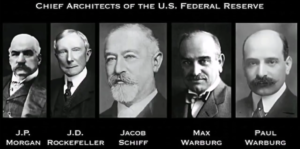
Exploring the Influence of Wealth and Power in America: Key Books and Insights
Understanding the dynamics of wealth and power in America is essential for comprehending the nation’s history and present.
Over the years, numerous authors have delved into this complex subject, providing valuable insights.
Among them, Ferdinand Lundberg and Kevin Phillips stand out for their seminal works.
Let’s explore their contributions and the impact of their writings.
Ferdinand Lundberg’s Seminal Works
Some 30 years after the release of “America’s Sixty Families,” Ferdinand Lundberg returned with a sequel.
This new volume, “The Rich and the Super-Rich,” published in 1968, offered an overview of the then-current state of the super-rich in America.
Lundberg’s works are indispensable for any serious study of the monied elite in the 20th century.
Kevin Phillips: From Conservative Architect to Populist Critic
In recent years, Kevin Phillips has emerged as a forceful critic of plutocratic power in America.
Initially known for his role in the Republican Party’s “Southern Strategy” that helped elect Richard Nixon, Phillips has shifted his focus.
He has authored several books criticizing the economic policies of the power elite, offering a populist perspective reminiscent of Thomas Jefferson.
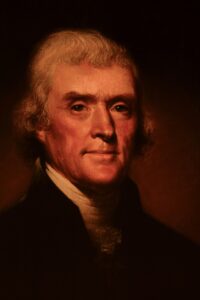
Key Works by Kevin Phillips:
- “Post-Conservative America: People, Politics, and Ideology“
- “The Politics of Rich and Poor: Wealth and the American Electorate in the Reagan Aftermath“
- “Boiling Point: Democrats, Republicans, and the Decline of Middle-Class Prosperity“
- “Arrogant Capital: Washington, Wall Street, and the Frustration of American Politics“
- “Wealth and Democracy: A Political History of the American Rich“
- “American Theocracy: The Peril and Politics of Radical Religion, Oil, and Borrowed Money in the 21st Century“
- “Bad Money: Reckless Finance, Failed Politics, and the Global Crisis of American Capitalism“
Phillips’ works are a powerful critique of the influence of Wall Street and big money interests, making him a controversial figure among GOP critics.
However, his books are an articulate exposition of traditional Americanism, standing against imperialism, global warmongering, and super-capitalism.
Carroll Quigley’s Insights into the Anglo-American Establishment
While many are familiar with Carroll Quigley’s “Tragedy and Hope: A History of the World in Our Time,” his other work, “The Anglo-American Establishment,” is equally fascinating.
Published in 1981, this book explores the ties between the Anglophilic “WASP” elite in the United States and the British imperial establishment.
Quigley examines the activities of Cecil Rhodes and his circle, providing valuable insights into the intertwining interests that have shaped global affairs.
Despite its importance, “The Anglo-American Establishment” is less cited by researchers.
One notable omission in the book is the role of the Rothschild Dynasty, which significantly influenced the Anglo-American establishment Quigley writes about.
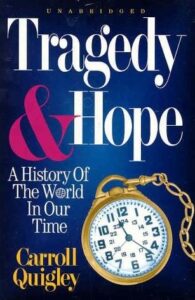
Unveiling the Rothschild Legacy: Key Works and Insights
In the book, The New Babylon, it explores the Rothschild family at length, positioning it as a significant resource on the topic.
However, British historian Niall Ferguson’s two-volume study, compiled in consultation with the Rothschild family, is considered the foremost mainstream work on their history.
Ferguson’s first volume, The House of Rothschild: Money’s Prophets: 1798-1848, was published by Penguin in 1999.
This was followed by The House of Rothschild: The World’s Banker (1849-1999) in 2000.
These works provide a panoramic view of the Rothschild family’s history, though they are somewhat favorable in their portrayal, as might be expected given the collaboration with the family.
One notable oversight in Ferguson’s work is the minimal coverage of the Rothschild family’s activities in the United States.
Contrary to Ferguson’s account, their influence in America has been significant.
Despite this gap, his books offer ample leads for researchers interested in the Rothschild legacy.
The family’s global intrigues are immense, influencing pivotal events such as wars, revolutions, and financial panics, often without explicit mention of their role.
- The Ruling Elite: A Study in Imperialism, Genocide and Emancipation (2011)
- The Ruling Elite: The Zionist Seizure of World Power (2012)
Provide fresh insights into historical events and personalities often misrepresented by mainstream and independent media alike.
Spingola’s books reveal a wealth of previously missing facts, painting a stunning panorama of hidden elements in the big picture.
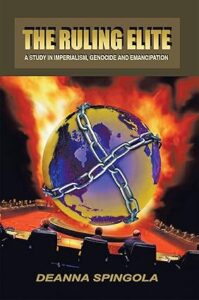
Her analysis covers war, slavery, genocide, plutocracy, and imperialism, highlighting the detrimental effects of rampant capitalism benefiting an elite few.
This alternative history of the American system offers a perspective unlike any other.
Her volumes serve as a veritable encyclopedia of little-known facts about key personalities and high-level elites who shaped American affairs from the Revolution to the late 20th century.
Spingola is a staunch opponent of the international slave system, tracing its origins and the major players who profited from it.
She also draws connections to the global opium trade, the Rothschild banking empire, and wars of conquest.
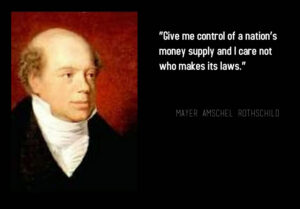
Deanna’s analysis of American expansionism and the genocide of American Indians sheds light on the elite families and financial groups behind these atrocities.
Her revelations challenge the views of those who see the decimation of Native Americans as a manifestation of “the American way.”
For those who believe they understand the New World Order, Spingola’s The Ruling Elite volumes offer enlightening information that presents a unique perspective, making them essential reads for a deeper understanding of history and power dynamics.
Unraveling the Influence of Elite Power Groups: Bilderberg, CFR, and Trilateral Commission
Understanding the influence of elite power groups like the Bilderberg Meetings, the Trilateral Commission, and the Council on Foreign Relations (CFR) requires sifting through a vast array of literature.
While much of the available material is filled with sensationalism and contradictory theories, there are some credible works that provide valuable insights into these organizations.
Exposing Bilderberg: In-Depth Insights
The Bilderberg Meetings, often shrouded in secrecy, have been a focus for many independent researchers.
American Free Press (AFP) has been at the forefront of exposing the activities of this group.
Through publications like Jim Tucker’s Bilderberg Diary and The Bilderberg Files, AFP has provided readers with detailed information about Bilderberg.
These works stand out among the numerous, often less credible, attempts to assess Bilderberg’s role in global affairs.
Scholarly Perspectives on the CFR and Trilateral Commission
For those interested in the Council on Foreign Relations (CFR), Imperial Brain Trust: The Council on Foreign Relations and United States Foreign Policy by is a must-read.
Published in 1977 by Monthly Review Press, this book offers an authoritative history of the CFR.
It avoids the sensational rhetoric common in “patriot” writings, presenting a more scholarly and factual account.
The CFR, as noted by Carroll Quigley in The Anglo-American Establishment, is an American offshoot of a secret society linked to the Rhodes Trust and the London-based Royal Institute of International Affairs.
Another noteworthy book is Holly Sklar’s Trilateralism: The Trilateral Commission and Elite Planning Management.
Published in 1980 by South End Press, this book, though somewhat dated, provides a rational and wide-ranging exploration of the motivations and manipulations of the Trilateral Commission, established by David Rockefeller.
It also includes an insightful overview of the history and operations of Bilderberg.

Limitations and Oversights in Mainstream Works
Despite their valuable contributions, both Imperial Brain Trust and Trilateralism have significant limitations.
They fail to address the Rothschild connection to these power blocs and the role of global Zionism in shaping world affairs.
While the CFR and the Trilateral Commission are often perceived as “Rockefeller-controlled,” the influence of the Rockefeller family is waning.
New forces, particularly within the Jewish global elite, are emerging.
The Power Behind the Throne: Unveiling the Rulers of America and the World
To truly understand America and the global landscape today, one must recognize who holds the reins of power.
Michael Collins Piper’s book, The New Babylon, published by American Free Press in 2009, serves as a primary resource on this subject.
Piper’s work has garnered positive feedback for its exploration of the elite families and financial forces that dictate American affairs through their control of the mass media and the economy, particularly via the Federal Reserve System.
Conclusion: Unmasking the Global Power Dynamics
Understanding the dynamics of wealth and power is crucial for comprehending the intricate web of influence that shapes both American and global affairs.
Michael Collins Piper’s The New Babylon provides a critical lens through which we can view the significant role played by elite families, especially the Rothschilds, in the New World Order.
The works of other authors, such as Lawrence H. Shoup, William Minter, Holly Sklar, Ferdinand Lundberg, and Kevin Phillips, further illuminate the control exerted by the CFR, Trilateral Commission, and other power groups.
Despite their valuable insights, these works often overlook the profound impact of Jewish high finance and the Rothschild Dynasty on global events.

Deanna Spingola’s revelations bring to light the hidden elements of history, exposing the intricate connections between war, slavery, genocide, and plutocracy.
Her in-depth analysis underscores the relentless pursuit of absolute power by the ruling elite, highlighting the importance of acknowledging these forces to fully grasp the nature of the New World Order.
For those who seek to understand the true origins and nature of global power dynamics, these works offer indispensable perspectives.
They challenge us to confront uncomfortable truths and encourage a deeper exploration of the forces that shape our world.
